
Ozempic Might Literally Change How Our Bodies Handle Booze, Study Finds
Scientists are learning more about the strange effects of Ozempic and similar GLP-1 drugs on alcohol use. New research shows that these obesity and diabetes medications might actually change how our bodies handle booze.
Virginia Tech researchers conducted the study, which tracked how GLP-1 users processed alcohol immediately after downing several drinks. Compared to non–GLP-1 users, the researchers found that those taking GLP-1s saw their blood alcohol levels rise more slowly and reported feeling less intoxicated overall. The findings appear to provide some insight into why GLP-1 drugs have shown promise as a treatment for alcohol use disorder.
“These data provide preliminary evidence that GLP-1RAs could act through peripheral mechanisms to suppress alcohol intake,” the authors wrote in their paper, published Wednesday in Scientific Reports.
A surprising loss of craving
Semaglutide (the active ingredient in Ozempic and Wegovy) and other GLP-1 drugs have changed the field of obesity treatment in recent years. They’ve proven to be far more effective at helping people lose weight than diet and exercise alone. Some doctors and GLP-1 users have also reported that these drugs seem to reduce cravings for things besides food as well, including potentially addictive drugs like opioids, cocaine, and alcohol. Several early studies have begun to support these observations, too.
Intriguing as all this is, there’s still a lot we don’t know about how and why these drugs may actually work to reduce people’s cravings for substances like alcohol. So researchers at Virginia Tech’s Fralin Biomedical Research Institute (FBRI) were interested in studying the immediate effects of alcohol on people taking GLP-1s.
They recruited 20 participants living with obesity (a body mass index over 30) for their small study. Half of the volunteers were taking one of three GLP-1 medications—semaglutide, tirzepatide, or liraglutide—while the other half weren’t on any of these drugs. Then the researchers got them drunk—in a controlled setting, of course.
The volunteers were asked to drink three alcoholic beverages over the course of an hour, and then they were monitored for up to four hours in a recovery room. Throughout this experiment, the volunteers had their blood alcohol, glucose, and vital signs, such as blood pressure, measured regularly.
The researchers gave the volunteers enough alcohol to raise their blood alcohol concentration to 0.08% by the end of the drinking period—the legal limit for driving in most of the U.S. But though both groups did roughly reach that same endpoint, the GLP-1 users saw their blood alcohol level rise more slowly on average, the researchers found. What’s more, the GLP-1 users also reported feeling less drunk subjectively during the experiment and reported having less of a craving for alcohol in general before and after the trial.
The findings suggest that GLP-1s can change the speed at which alcohol enters the bloodstream, the researchers say, possibly through slowed gastric emptying from the stomach, a known GLP-1 effect. This slower introduction can then make alcohol less potentially addictive.
“Why would this matter? Faster-acting drugs have a higher abuse potential,” said study author Alex DiFeliceantonio, assistant professor and interim co-director of the FBRI’s Center for Health Behaviors Research, in a statement from the university. “They have a different impact on the brain. So if GLP-1s slow alcohol entering the bloodstream, they could reduce the effects of alcohol and help people drink less.”
More to learn
The researchers do note their work should be viewed as a pilot study, meaning more studies are needed to confirm the team’s findings. Some research has also indicated that GLP-1s can also directly affect the brain’s reward system linked to alcohol and other drug use, possibly providing another way these medications can temper our cravings.
However these drugs work, the most important tests of their potential are yet to come. There are now several clinical trials of GLP-1 therapy for substance use disorders, including alcohol use disorder, underway. Should these trials pan out, GLP-1 drugs could become a tantalizing option for treating these difficult-to-manage disorders.
First Appeared on
Source link






